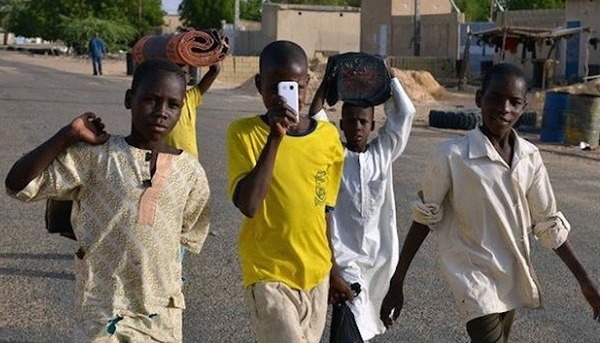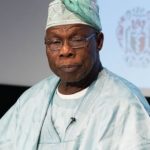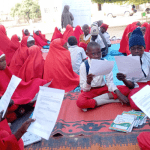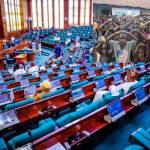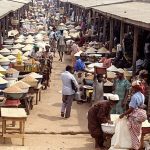The House of Representatives is confident its partnership with the federal government will significantly reduce the increasing number of out-of-school children using the alternative schooling initiatives.
This is as the government reaffirms its determination to strengthen
education through a range of measures that will guarantee every child has access to quality education.
The Committee on Alternative Education is one of the latest measures to address the growing number of out of school children in the country.
A UNESCO report in 2021 ranked Nigeria third among nation’s with high rates of out-of-school children coming after India and Pakistan.
The UN agency in 2022, said about 20 million Nigerian children, representing 10% of the estimated Nigerian population, are not in school.
Experts fear the steady rise in the number of out-of-school children may continue to fuel insecurity, with teenage children remaining vulnerable to being lured into banditry and other criminal activities.
This initiative spearheaded by the parliament is targetted at training children not in school with relevant skills to become productive members of society.
The engagement between the executive and the parliament is to share perspectives towards overcoming the challenge.
The Committee Chairman says the fall out of the recent national protest makes it urgent for concerned persons to come up with measures that are realistic.
The forum provides a good place for the government at the centre to create awareness about ongoing efforts.
The Ministers of Finance and Coordinating Minister of the Economy as well as his Budget and National Planning counterpart highlight key progress in enhancing school security.
This, includes, the establishment of the Secretariat for Financing Safe Schools, a four-year plan to strengthen school security by 2026.
The House of Representatives is confident its partnership with the federal government will significantly reduce the increasing number of out-of-school children using the alternative schooling initiatives.
This is as the government reaffirms its determination to strengthen
education through a range of measures that will guarantee every child has access to quality education.
The Committee on Alternative Education is one of the latest measures to address the growing number of out of school children in the country.
A UNESCO report in 2021 ranked Nigeria third among nation’s with high rates of out-of-school children coming after India and Pakistan.
The UN agency in 2022, said about 20 million Nigerian children, representing 10% of the estimated Nigerian population, are not in school.
Experts fear the steady rise in the number of out-of-school children may continue to fuel insecurity, with teenage children remaining vulnerable to being lured into banditry and other criminal activities.
This initiative spearheaded by the parliament is targetted at training children not in school with relevant skills to become productive members of society.
The engagement between the executive and the parliament is to share perspectives towards overcoming the challenge.
The Committee Chairman says the fall out of the recent national protest makes it urgent for concerned persons to come up with measures that are realistic.
The forum provides a good place for the government at the centre to create awareness about ongoing efforts.
The Ministers of Finance and Coordinating Minister of the Economy as well as his Budget and National Planning counterpart highlight key progress in enhancing school security.
This, includes, the establishment of the Secretariat for Financing Safe Schools, a four-year plan to strengthen school security by 2026.
The House of Representatives is confident its partnership with the federal government will significantly reduce the increasing number of out-of-school children using the alternative schooling initiatives.
This is as the government reaffirms its determination to strengthen
education through a range of measures that will guarantee every child has access to quality education.
The Committee on Alternative Education is one of the latest measures to address the growing number of out of school children in the country.
A UNESCO report in 2021 ranked Nigeria third among nation’s with high rates of out-of-school children coming after India and Pakistan.
The UN agency in 2022, said about 20 million Nigerian children, representing 10% of the estimated Nigerian population, are not in school.
Experts fear the steady rise in the number of out-of-school children may continue to fuel insecurity, with teenage children remaining vulnerable to being lured into banditry and other criminal activities.
This initiative spearheaded by the parliament is targetted at training children not in school with relevant skills to become productive members of society.
The engagement between the executive and the parliament is to share perspectives towards overcoming the challenge.
The Committee Chairman says the fall out of the recent national protest makes it urgent for concerned persons to come up with measures that are realistic.
The forum provides a good place for the government at the centre to create awareness about ongoing efforts.
The Ministers of Finance and Coordinating Minister of the Economy as well as his Budget and National Planning counterpart highlight key progress in enhancing school security.
This, includes, the establishment of the Secretariat for Financing Safe Schools, a four-year plan to strengthen school security by 2026.
The House of Representatives is confident its partnership with the federal government will significantly reduce the increasing number of out-of-school children using the alternative schooling initiatives.
This is as the government reaffirms its determination to strengthen
education through a range of measures that will guarantee every child has access to quality education.
The Committee on Alternative Education is one of the latest measures to address the growing number of out of school children in the country.
A UNESCO report in 2021 ranked Nigeria third among nation’s with high rates of out-of-school children coming after India and Pakistan.
The UN agency in 2022, said about 20 million Nigerian children, representing 10% of the estimated Nigerian population, are not in school.
Experts fear the steady rise in the number of out-of-school children may continue to fuel insecurity, with teenage children remaining vulnerable to being lured into banditry and other criminal activities.
This initiative spearheaded by the parliament is targetted at training children not in school with relevant skills to become productive members of society.
The engagement between the executive and the parliament is to share perspectives towards overcoming the challenge.
The Committee Chairman says the fall out of the recent national protest makes it urgent for concerned persons to come up with measures that are realistic.
The forum provides a good place for the government at the centre to create awareness about ongoing efforts.
The Ministers of Finance and Coordinating Minister of the Economy as well as his Budget and National Planning counterpart highlight key progress in enhancing school security.
This, includes, the establishment of the Secretariat for Financing Safe Schools, a four-year plan to strengthen school security by 2026.
The House of Representatives is confident its partnership with the federal government will significantly reduce the increasing number of out-of-school children using the alternative schooling initiatives.
This is as the government reaffirms its determination to strengthen
education through a range of measures that will guarantee every child has access to quality education.
The Committee on Alternative Education is one of the latest measures to address the growing number of out of school children in the country.
A UNESCO report in 2021 ranked Nigeria third among nation’s with high rates of out-of-school children coming after India and Pakistan.
The UN agency in 2022, said about 20 million Nigerian children, representing 10% of the estimated Nigerian population, are not in school.
Experts fear the steady rise in the number of out-of-school children may continue to fuel insecurity, with teenage children remaining vulnerable to being lured into banditry and other criminal activities.
This initiative spearheaded by the parliament is targetted at training children not in school with relevant skills to become productive members of society.
The engagement between the executive and the parliament is to share perspectives towards overcoming the challenge.
The Committee Chairman says the fall out of the recent national protest makes it urgent for concerned persons to come up with measures that are realistic.
The forum provides a good place for the government at the centre to create awareness about ongoing efforts.
The Ministers of Finance and Coordinating Minister of the Economy as well as his Budget and National Planning counterpart highlight key progress in enhancing school security.
This, includes, the establishment of the Secretariat for Financing Safe Schools, a four-year plan to strengthen school security by 2026.
The House of Representatives is confident its partnership with the federal government will significantly reduce the increasing number of out-of-school children using the alternative schooling initiatives.
This is as the government reaffirms its determination to strengthen
education through a range of measures that will guarantee every child has access to quality education.
The Committee on Alternative Education is one of the latest measures to address the growing number of out of school children in the country.
A UNESCO report in 2021 ranked Nigeria third among nation’s with high rates of out-of-school children coming after India and Pakistan.
The UN agency in 2022, said about 20 million Nigerian children, representing 10% of the estimated Nigerian population, are not in school.
Experts fear the steady rise in the number of out-of-school children may continue to fuel insecurity, with teenage children remaining vulnerable to being lured into banditry and other criminal activities.
This initiative spearheaded by the parliament is targetted at training children not in school with relevant skills to become productive members of society.
The engagement between the executive and the parliament is to share perspectives towards overcoming the challenge.
The Committee Chairman says the fall out of the recent national protest makes it urgent for concerned persons to come up with measures that are realistic.
The forum provides a good place for the government at the centre to create awareness about ongoing efforts.
The Ministers of Finance and Coordinating Minister of the Economy as well as his Budget and National Planning counterpart highlight key progress in enhancing school security.
This, includes, the establishment of the Secretariat for Financing Safe Schools, a four-year plan to strengthen school security by 2026.
The House of Representatives is confident its partnership with the federal government will significantly reduce the increasing number of out-of-school children using the alternative schooling initiatives.
This is as the government reaffirms its determination to strengthen
education through a range of measures that will guarantee every child has access to quality education.
The Committee on Alternative Education is one of the latest measures to address the growing number of out of school children in the country.
A UNESCO report in 2021 ranked Nigeria third among nation’s with high rates of out-of-school children coming after India and Pakistan.
The UN agency in 2022, said about 20 million Nigerian children, representing 10% of the estimated Nigerian population, are not in school.
Experts fear the steady rise in the number of out-of-school children may continue to fuel insecurity, with teenage children remaining vulnerable to being lured into banditry and other criminal activities.
This initiative spearheaded by the parliament is targetted at training children not in school with relevant skills to become productive members of society.
The engagement between the executive and the parliament is to share perspectives towards overcoming the challenge.
The Committee Chairman says the fall out of the recent national protest makes it urgent for concerned persons to come up with measures that are realistic.
The forum provides a good place for the government at the centre to create awareness about ongoing efforts.
The Ministers of Finance and Coordinating Minister of the Economy as well as his Budget and National Planning counterpart highlight key progress in enhancing school security.
This, includes, the establishment of the Secretariat for Financing Safe Schools, a four-year plan to strengthen school security by 2026.
The House of Representatives is confident its partnership with the federal government will significantly reduce the increasing number of out-of-school children using the alternative schooling initiatives.
This is as the government reaffirms its determination to strengthen
education through a range of measures that will guarantee every child has access to quality education.
The Committee on Alternative Education is one of the latest measures to address the growing number of out of school children in the country.
A UNESCO report in 2021 ranked Nigeria third among nation’s with high rates of out-of-school children coming after India and Pakistan.
The UN agency in 2022, said about 20 million Nigerian children, representing 10% of the estimated Nigerian population, are not in school.
Experts fear the steady rise in the number of out-of-school children may continue to fuel insecurity, with teenage children remaining vulnerable to being lured into banditry and other criminal activities.
This initiative spearheaded by the parliament is targetted at training children not in school with relevant skills to become productive members of society.
The engagement between the executive and the parliament is to share perspectives towards overcoming the challenge.
The Committee Chairman says the fall out of the recent national protest makes it urgent for concerned persons to come up with measures that are realistic.
The forum provides a good place for the government at the centre to create awareness about ongoing efforts.
The Ministers of Finance and Coordinating Minister of the Economy as well as his Budget and National Planning counterpart highlight key progress in enhancing school security.
This, includes, the establishment of the Secretariat for Financing Safe Schools, a four-year plan to strengthen school security by 2026.

